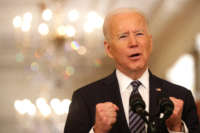
During a prime-time address to the nation on Thursday night, President Joe Biden condemned hate crimes against Asian Americans, which have surged since the pandemic hit the U.S. a year ago.
“At this very moment, so many of them, our fellow Americans, they’re on the front lines of this pandemic trying to save lives, and still they are forced to live in fear for their lives, just walking down streets in America,” Biden said. “It’s wrong, it’s un-American, and it must stop.”
A recent poll has shown that 75 percent of Asian Americans are fearful of increased hate crimes and discrimination. Violent attacks in places like San Francisco and New York have left the Asian community on edge. In January, Asian Americans reported two violent attacks against elderly Asian people in California, one of whom died from his injuries.
Last year, New York City officials reported a dramatic increase in violence against Asian Americans: Between February and April of 2020, there were 105 reported counts of anti-Asian harassment and discrimination, versus only five in 2019.
Between March and the end of 2020, Stop AAPI Hate received over 2,800 counts of anti-Asian hate incidents. A recent report by California State University, San Bernardino, found that, in 16 cities across the country, hate crimes against Asians rose by 150 percent in 2020.
However, it’s entirely possible that the actual hate crime numbers could be even higher. The U.S. government has a history of vastly undercounting hate crimes.
Former President Donald Trump continually referred to COVID-19 using racist terms like the “kung flu” or the “Chinese virus.” This terminology from Trump exacerbated xenophobia and racism against Asian Americans during the public health crisis, experts say.
Flaring of racism and xenophobia during public health crises, especially against Asian Americans, has a long history in the U.S. During the SARS outbreak in 2003, there were reports of people actively avoiding Asian Americans in public. An outbreak of the bubonic plague in 1899, which was later found to be spread by rats and vermin at the time, caused public health officials to lock down a predominantly Asian neighborhood in Honolulu, Hawaii, and attempt to “sanitize” the neighborhood by setting fires.
Many Americans view the COVID-19 pandemic as China’s fault and negative perceptions of the country have soared, especially among Republicans.
As Asian American celebrities and advocates have raised awareness about the violence, however, they say that Biden’s actions to oppose the violence have thus far been lacking, or even harmful. Biden’s agenda on ending anti-Asian hate crimes includes empowering the Justice Department to prosecute them. But, as activists and advocates have pointed out, increasing policing and pushing hate crime statutes can often empower the wrong people and lead to further violence.
“While calling out anti-Asian racism and violence is vital, the violence that Asian Americans experience is deeper than just hateful attitudes or interpersonal racial bias, it is also a story of state violence, including police-perpetrated violence,” wrote Jason Wu for Truthout.
When people call for more policing in the face of anti-Asian hate crimes, Wu writes, they not only hurt their own cause but also the cause of the Black protesters and abolitionists who have fought hard against policing.
This post was originally published on Latest – Truthout.